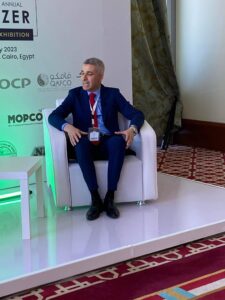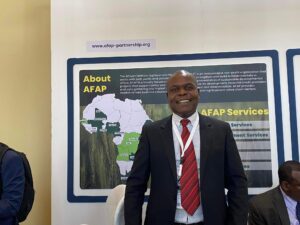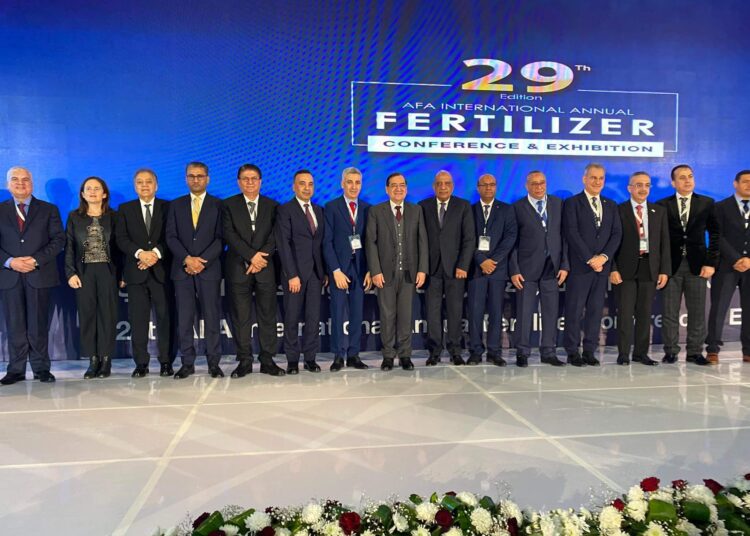In light of agricultural and climate challenges, the key stakeholders in fertilizer industry are trying to strike a balance between enhancing agricultural productivity and curbing greenhouse emissions caused by the industry. Recently, representatives from 36 countries from more than 180 companies gathered in Egypt in the annual International Fertilizers Conference to discuss all aspects related to fertiliser industry under the slogan “Resilience for Sustainable Food Security”.
It is worth noting that the industry is grappling with the severe economic crises and turbulent conditions like the repercussions of COVID-19, the Russian-Ukrainian crisis, and the subsequent rise in energy prices, a matter that undoubtedly affects the whole industry. It has put the entire global food security under a severe test.

“This region plays vital role in two things. The first is energy security and energy transitions through opportunities to invest in a lower carbon ammonia and lower carbon hydrogen. The second thing is the indirect but very, very important role of this region in supporting protect food security globally through provision of fertilizers.Even though this region imports a lot of food, It has sufficient supply of fertilizers, nitrogen fertilizers and other fertilizers to help support food security globally,” Alzbeta Klein, Director General of the International Fertilizer Association (IFA), told The Egyptian Mail.
Klein , meanwhile, pointed out that the geopolitical challenges have fundamentally reshaped the map of the world and fundamentally refocused the world on the need for food security, and on the need for energy security.
“We essentially invite food security and energy security to our table, to our discussions. The world looks very different because of that,” she added.
Regarding the balance between energy transition and energy security , the senior official said that the world does not have the luxury to do it sequentially. “We have to do it all at the same time, both in energy and in food. We need to deal simultaneously with availability affordability and sustainability, ” she stressed.

Saad Abu El-Maati, Secretary General of the Arab Fertilizer Association, said that there are great challenges facing the industry in the Arab world. In the meantime, he stressed the need to deal with this file through a comprehensive view, ensuring the optimal use of fertilizers with the aim to increase production from the agricultural area, in light of the disturbances of the food security system.
He also referred to the significant contributions of the Arab community in combating hunger and ensuring the continuity of the Arab food basket.
It is worth mentioning that the International Technical Conference of Fertilizers in its thirty-fifth edition is to be held under the slogan “The Path to Carbon Neutrality”.

Mohamed Taher Heouaine, Board Director of the Arab Fertiliser Association, stressed that the future of agriculture is in Africa. Africa is a real promising market, he added.
“ Despite this great potential, Africa is still grappling with numerous problems like poverty , desertification and economic hurdles. There are also certain challenges related to logistics. For example, Zambia is a great country in terms of agriculture, but fertilizers come to it from Addis Ababa due to lack of adequate logistics,” he noted.
As for reducing the industry’s carbon footprint, the senior official said that it is a real ‘test’. “There should be more awareness about climate change issues. But, in the new projects, the environmental dimension is given a top priority,” he stressed.

In a related context, an official from African Fertilizer and Agribusiness Partnership (AFAP), told the newspaper that they are trying to enhance collaboration with both public and private sectors to meet the African demands.
“ We are focused on implementation of sustainable developmental projects. We are also offering market-driven business solutions,” he added.
In his speech at the opening ceremony, Mahmoud Esmat, Minister of Public Enterprise, confirmed that the Egyptian fertilizer industry has maintained its important role in supporting the national economy, as it ranked second in exports for the year 2022, with a value of approximately $2.7 billion.
The minister added that the annual production capacities of fertilizers amount to approximately 7.8 million tons of nitrogen fertilizers, 7 million tons of phosphate rock, and 4 million tons of phosphate fertilizers.
He explained that the Egyptian industry in general, and the fertilizer industry in particular, has maintained excellent production rates in light of the interest and support that the political leadership and the government attach to this file.






Discussion about this post